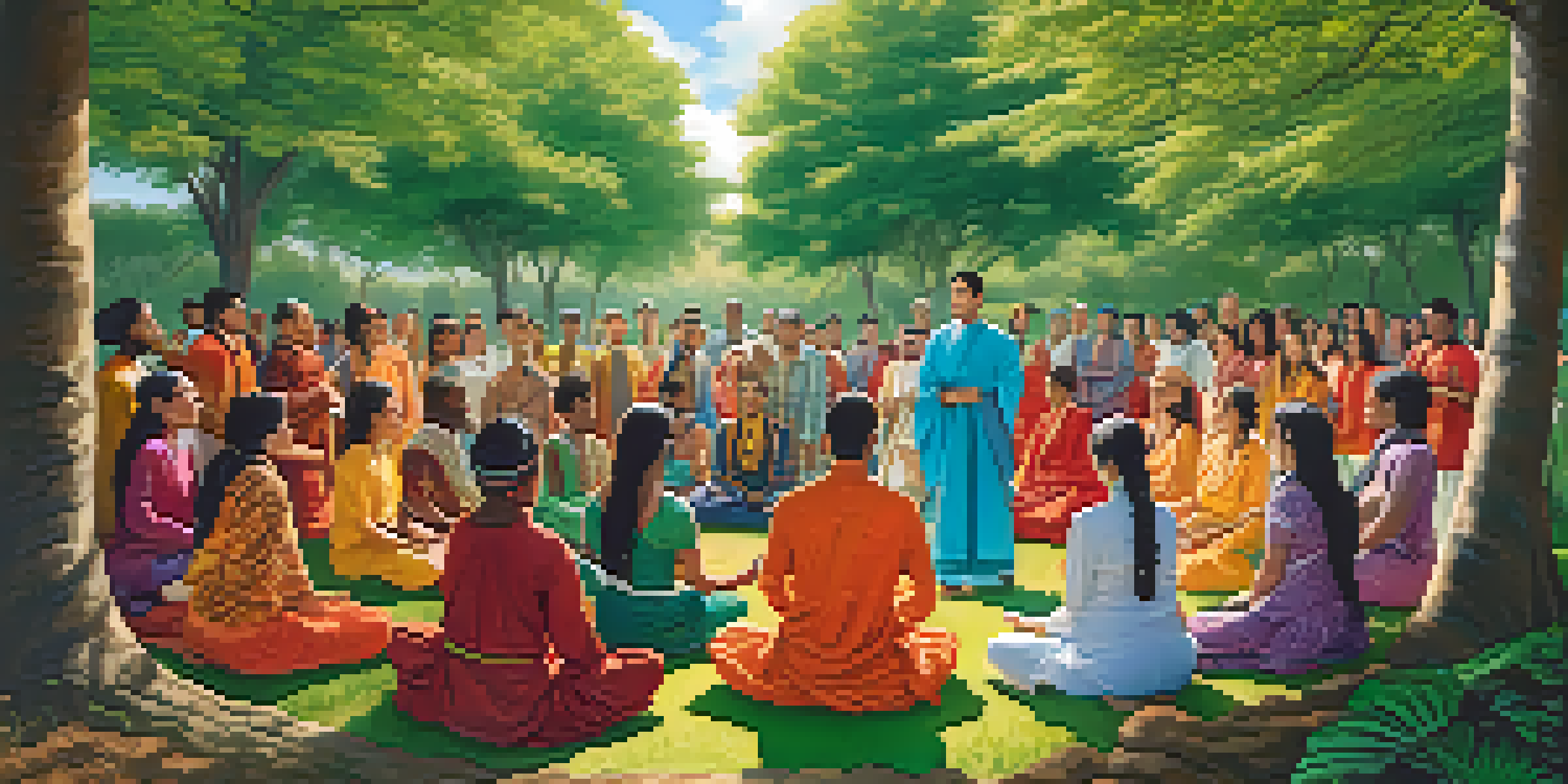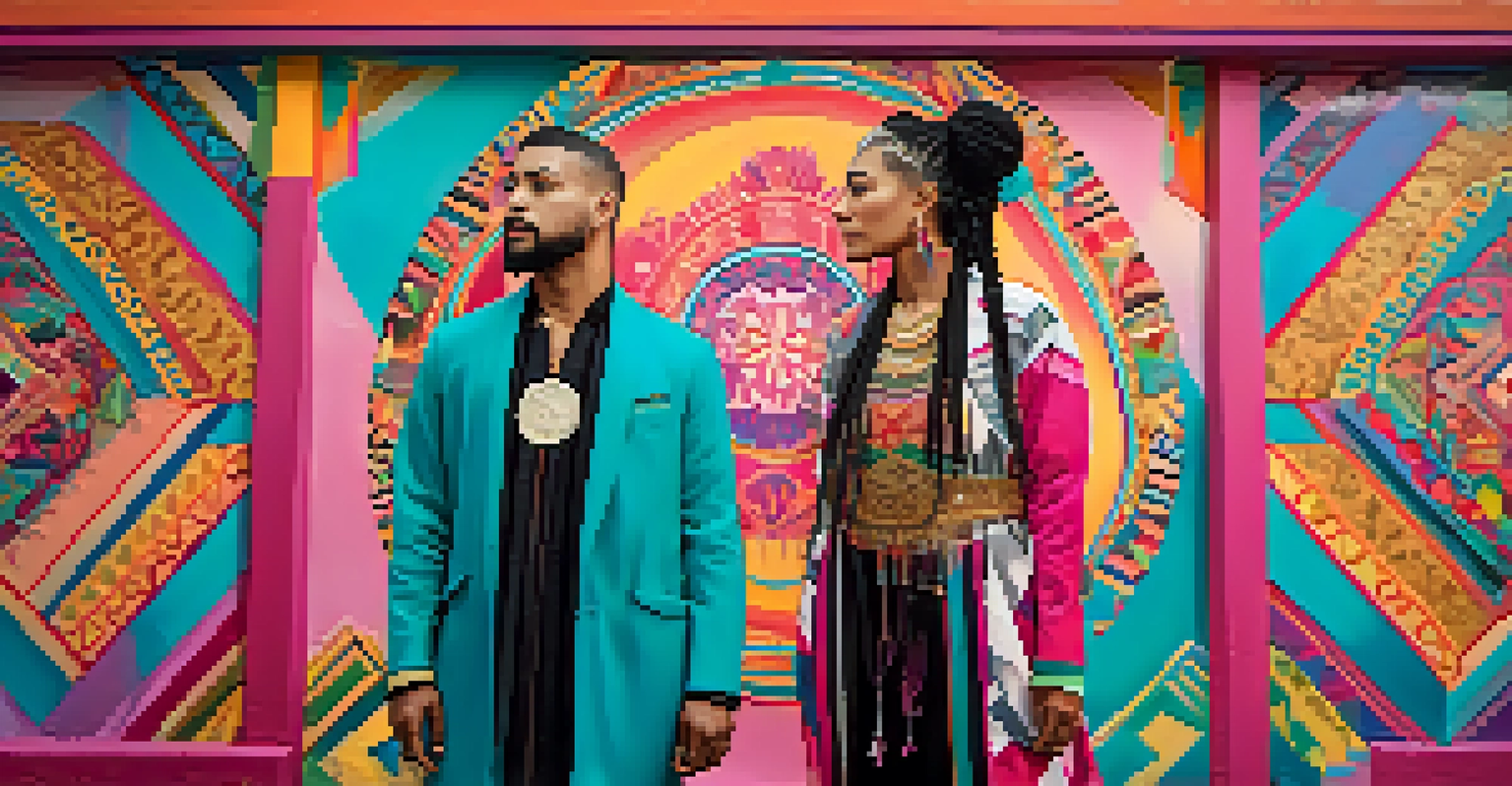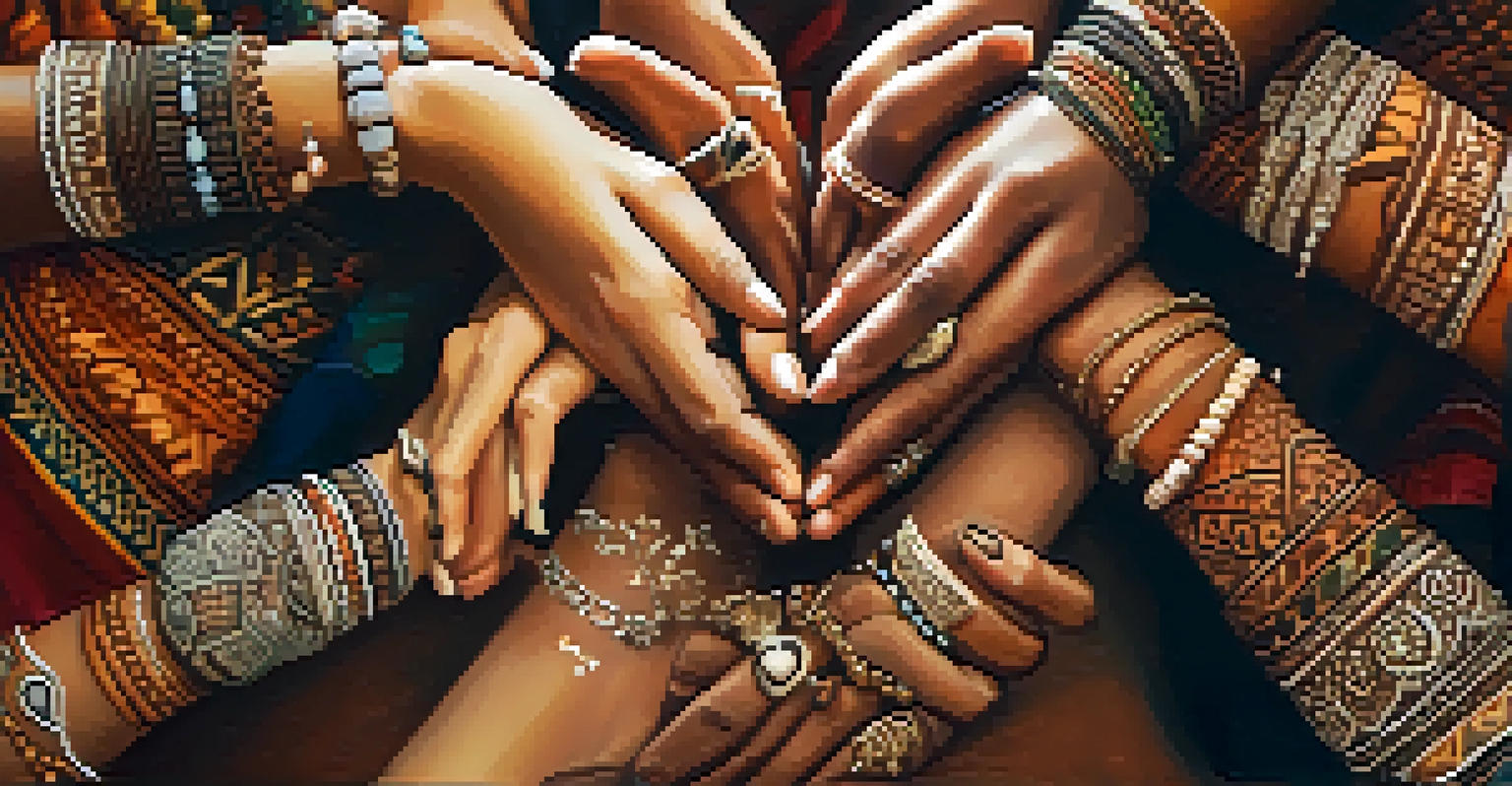Spirituality and Gender Roles in Diverse Global Cultures

Understanding Spirituality's Impact on Gender Roles
Spirituality often serves as a guiding force in many cultures, influencing how individuals perceive their roles in society. At its core, spirituality encompasses a sense of connection to something greater, which can shape beliefs about gender. For instance, in many Indigenous cultures, spiritual beliefs directly inform gender roles, offering unique perspectives on masculinity and femininity.
Spirituality can be a source of strength and validation for all gender identities.
In some societies, spiritual practices celebrate gender diversity, recognizing that gender is not strictly binary. This acknowledgment allows for a more fluid understanding of roles, enabling individuals to express themselves authentically. As spirituality evolves, so too do the interpretations of gender, challenging traditional norms and offering new ways to relate to one another.
By examining spirituality through this lens, we can uncover the intricate ways it shapes gender dynamics. It invites us to reflect on our own beliefs and how they may reinforce or challenge societal expectations. In many cases, this exploration reveals a tapestry of practices and beliefs that both honor and redefine gender roles.
Gender Roles in Eastern Spiritual Traditions
Eastern spiritual traditions, such as Hinduism and Buddhism, often present nuanced gender roles that reflect a deep philosophical understanding of existence. In Hinduism, the concept of Shakti represents feminine energy, emphasizing the importance of women as powerful forces of creation. Conversely, traditional interpretations can also confine women to specific roles, revealing a complex interplay between reverence and restriction.

Buddhism offers another perspective, with its teachings on non-attachment encouraging followers to transcend gender distinctions. In many Buddhist communities, women have taken on significant spiritual leadership roles, challenging conventional gender hierarchies. This shift demonstrates how spiritual practices can empower individuals, regardless of gender, to pursue enlightenment and compassion.
Spirituality Shapes Gender Roles
Spiritual beliefs influence how gender roles are perceived and can either reinforce or challenge societal expectations.
These traditions highlight the duality of gender roles within spirituality, showcasing both the reverence for feminine qualities and the challenges posed by patriarchal structures. As these spiritual practices continue to evolve, they foster discussions about equality and empowerment, ultimately reshaping how gender is perceived and practiced.
Indigenous Beliefs and Gender Fluidity
Indigenous cultures around the world often have rich spiritual traditions that embrace gender fluidity. Many Native American tribes recognize Two-Spirit individuals, who embody both masculine and feminine traits, viewing them as sacred. This acknowledgment contrasts sharply with Western binary gender norms, illustrating how spirituality can celebrate diversity.
The future belongs to those who believe in the beauty of their dreams.
In these cultures, gender is not merely a biological attribute but a social and spiritual identity that can shift over time. The acceptance of Two-Spirit people within Indigenous spiritual practices empowers them to fulfill unique roles in their communities, often as healers or mediators. This highlights the integral connection between spirituality and the acceptance of varied gender expressions.
By valuing gender fluidity within spiritual frameworks, Indigenous cultures challenge conventional gender roles and promote a more inclusive understanding of identity. This serves as a powerful reminder that spirituality can be a source of strength and validation for all gender identities, encouraging us to rethink our own perceptions.
Western Spirituality and Its Gender Constructs
Western spirituality, particularly within Christianity, has historically imposed strict gender roles, often depicting men as leaders and women as subservient. This paradigm has shaped societal expectations, influencing everything from family dynamics to career choices. However, contemporary movements within Christianity are beginning to challenge these constructs, advocating for gender equality in spiritual leadership.
Feminist theologians have emerged as key voices in this transformation, arguing for a reinterpretation of sacred texts to promote inclusivity. By highlighting female figures in the Bible and their significance, these scholars are reshaping the narrative around gender roles in spirituality. This shift not only empowers women but also enriches the spiritual experience for all believers.
Eastern Traditions Embrace Nuance
Eastern spiritual traditions often present complex gender roles that empower individuals beyond conventional binaries.
As Western spirituality evolves, it increasingly embraces a more egalitarian approach, recognizing the value of diverse voices and experiences. This change reflects a broader societal shift towards gender equality, demonstrating that spirituality can adapt and grow in line with contemporary values, ultimately fostering a more inclusive environment.
The Role of Spirituality in Gender Activism
Spirituality has long been a source of inspiration for gender activism, providing a moral foundation for challenging oppressive structures. Many activists draw upon spiritual teachings to advocate for equality, using their beliefs as a catalyst for change. This intersection of spirituality and activism highlights the powerful role that faith can play in social movements.
For instance, organizations like the Women's March have incorporated spiritual elements, creating inclusive spaces for diverse voices. By grounding their activism in shared spiritual values, participants can connect on a deeper level, fostering solidarity and empowerment. This approach demonstrates that spirituality can unite people across various backgrounds in the pursuit of justice.
As gender activism continues to evolve, the integration of spirituality offers a holistic framework for advocating change. It emphasizes the importance of compassion, understanding, and community, reminding us that the fight for gender equality is not just a political struggle but also a deeply personal and spiritual journey.
Global Perspectives on Gender and Spirituality
Around the world, diverse cultures offer unique perspectives on the relationship between gender and spirituality. In Africa, for instance, many spiritual practices honor the roles of women as custodians of tradition and healers. This recognition underscores the vital contributions women make to their communities, often positioning them as central figures in spiritual life.
Similarly, in various Asian cultures, spirituality often intertwines with gender roles, shaping societal expectations. In Shinto practices, for example, women play essential roles in rituals and ceremonies, showcasing their spiritual significance. These examples reveal how cultural context can influence the understanding and expression of gender within spiritual frameworks.
Activism and Spirituality Unite
Spirituality serves as a foundation for gender activism, inspiring movements that advocate for equality and inclusivity.
By examining these global perspectives, we can appreciate the rich tapestry of beliefs and practices that shape gender roles. This exploration fosters greater understanding and respect for different cultural traditions, encouraging us to embrace diversity in our own spiritual journeys.
The Future of Spirituality and Gender Dynamics
Looking ahead, the future of spirituality and gender dynamics is poised for transformation as society continues to evolve. With growing awareness of gender diversity and fluidity, spiritual practices are adapting to embrace these changes. This evolution presents an opportunity for individuals to explore their identities within spiritual contexts, free from traditional constraints.
Emerging spiritual movements are increasingly inclusive, celebrating a variety of gender expressions and encouraging dialogue about gender roles. This shift fosters an environment where individuals can find authenticity in their spiritual journeys, leading to more meaningful experiences. As we move forward, it's essential to remain open to the possibilities that arise from this evolving landscape.

Ultimately, the interplay between spirituality and gender will continue to shape our understanding of identity and connection. By embracing diversity and fostering inclusivity, we can create spiritual spaces that honor all individuals, paving the way for a more equitable and compassionate world.